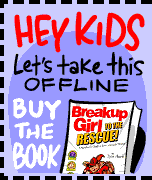

     |
| July 31, 2000 |
|
|||
|
Did everyone vote on this week's front page poll question?
Or last week's?
Turns out the questions, unlike Survivor itself, do have some basis in reality. Or psychology, anyway. When you do go back to reading, check out the current Psychology Today cover story: What's Your Love Story? According to Robert J. Sternberg, Ph.D., author of Love is a Story: A New Theory of Relationships, people tend to seek and act out our relationships according to plots we've had in development since childhood. And that we then direct and star in. (Insert wisecracks about "Braveheart," "Unforgiven," etc.) Some of them are actually pretty good stories. Sternberg's research -- yay, research! -- shows that among the most popular are:
Then again, you can probably guess the endings of some of these (thankfully less popular) stories:
Still, having a story is neither inherently good or bad ... it's all in how you tell it. And to whom. The key is to sift through all the literary interpretation and Cliffs Notes and highlighted passages and get to the point. What is your story? (No fair saying "Sex and the City.") Dr. Sternberg writes: "To figure out what we want, we need to consider all of our past relationships, and we should ask ourselves what attributes characterized the people to whom we felt most attracted, and what attributes characterized the people in whom we eventually lost interest. We also need to see what romantic tale we aim to tell -- and whether or not it has the potential to lead to a 'happily ever after' scenario in the first place. So try and suss your story out as such. A. Story. Remember: it's not Bad, not trashy fiction, not lies. Just...a pattern. A formula. And formulas work, you know. They speak to something inside us; they can keep things interesting and exciting even though we know the boat's going down. But the point is -- as I told El Gato and Been Played -- once you get that you've made all this stuff up in the first place, you can decide whether want to sign off on it as it, or mark it up with pencil, or start with a whole fresh new sheet in the Smith-Corona. You should also remember that if/when you get to the part where girl/boy does meet boy/girl, well, that person is not just an extra in the epic that is your life. Rather, you just wrote in someone with a story of his/her own. And the two are not always inherently compatible (explosions vs subtitles, etc.). Or maybe you'll find yourselves in one plot with two damsels/dudes in distress! ("I need to be rescued!" "Me too!" "Uh oh!" "Whose turn?") Or: "All we do is watch each other brush our teeth. We both must have a "Big Brother" story." As Sternberg writes: "People complain that they keep ending up with the same kind of bad partner, that they are unlucky in love. In reality, luck has nothing to do with it. They are subconsciously finding people to play out their love stories, or foisting their stories on the people they meet. ... unless we change our stories, we're treating symptoms rather than causes. If we're dissatisifed with our partner, we should look not at his or her faults, but at how he or she fits into our expectations... Once we've recognized our story -- or learned to live a healthy one of our choosing -- we can begin to recognize elements of that story in potential mates." (See also BG's columns on change and learning from experience.) I also heard this joke about Hollywood producers: A bunch of people are walking in the middle of the street in the middle of the night. A truck comes along and flattens them all. Q. Which one is the movie studio executive? A. The one who jumps up and says, "Here's why that just happened." But seriously. If you all of a sudden find yourself CEO of Breakup Productions., you can -- as I told Jason and Cynthia -- also use stories to make sense of what just happened...especially if your partner's not pitching any compelling ideas on his/her own. And remember, even familiar formulas can have comforting, happy endings, or even -- as in the Tale of the Magic Beans -- lay the groundwork for something that never happens in the movies: an even better sequel. * ("The Patriot" not included as film itself is longer than most relationships)
|
||||
|
||||

 |
